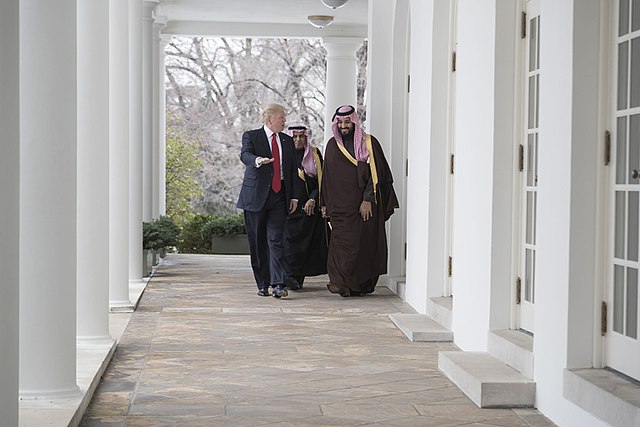by William D. Hartung
Saudi Crown Prince Mohammed bin Salman—popularly referred to as MbS—will be in Washington next week to kick off a two-week U.S. public-relations tour designed to solidify his image as a reformer and seek investments in his ambitious reform plan for the Saudi economy.
Given his aggressive foreign policy and record of internal repression, MbS’s attempt to burnish his image during his U.S. trip should be a hard sell. But he has prominent admirers in the U.S. press like David Ignatius of The Washington Post and Thomas Friedman of The New York Times in his corner, and is one of Donald Trump’s favorite world leaders. Perhaps this Sunday’s interview with MbS on CBS 60 Minutes will highlight his war-mongering and human-rights abuses as much or more than his claims to be a refreshing force for reform. But the danger remains that at least some parts of the mainstream press will whitewash MbS’s record.
As such, MbS’s visit, which is slated to include everyone from Donald Trump and his top security officials to Wall Street executives and Silicon Valley moguls, could at least partially succeed in meeting his main objectives. It’s up to opponents of MbS’s human rights record and his brutal war in Yemen to make sure it doesn’t.
The Saudi crown prince’s visit may coincide with a vote on a bill sponsored by Senators Bernie Sanders (I-VT), Mike Lee (R-UT), and Chris Murphy (D-CT) that would end U.S. refueling and targeting support for the Saudi-led war in Yemen, unless and until Congress authorizes the U.S. military role there. The initiative, which comports with the role carved out for Congress in the constitution and the War Powers Resolution of 1973, is part of a growing mood of opposition in Congress to the U.S. role in arming and enabling the Saudi/UAE-led war in Yemen.
U.S. planes, bombs, and missiles are a staple of the Saudi intervention. The Obama administration made a record $115 billion in arms offers to Saudi Arabia during its two terms in office, and one of Donald Trump’s first major foreign policy actions was to reverse a suspension of a sale of precision-guided bombs to Saudi Arabia imposed by the Obama administration due to concerns about the killing of civilians in Saudi air strikes in Yemen. As Colby Goodman, director of the Security Assistance Monitor, put it on the occasion of a release of a new report on arms sales trends during the Obama and Trump administrations, “Signing off on missile and bomb sales to Saudi Arabia when the country is using these weapons to attack the civilian population in Yemen sends an alarming signal about U.S. support for human rights.”
Thousands of civilians caught up in the conflict have died in Saudi airstrikes that have utilized U.S. aircraft and bombs, and a Saudi/UAE led blockade has put millions of Yemenis are risk of famine. In addition, hundreds of thousands of civilians in Yemen are suffering from the worst cholera outbreak in history, sparked in part by the Saudi coalition’s relentless destruction of civilian infrastructure. Rep. Ted Lieu (D-CA) has rightly noted that the Saudi actions in Yemen “look like war crimes.”
MbS was the driving force behind the Saudi intervention, which began in March 2015. These are hardly the actions of a “reformer,” unless by reform one means setting new standards for abusing human rights, killing civilians, and wreaking havoc in a region already awash in conflicts.
MbS’s domestic record is no better. Although his promotion of changes like allowing women to drive and easing up on curbs on public entertainment have drawn praise, they hardly make up for his harsh political crackdown and drive for unquestioned authority. As The New York Times reported earlier this week, his so-called anti-corruption campaign, which involved arresting prominent Saudi business, political, and military leaders without due process, included physical abuse of detainees and seizure of their assets. This unprecedented move against the regime’s powerbrokers was motivated by MbS’s desire to consolidate his power, not any genuine concern with corruption. This point is underscored by his own accumulation of wealth, believed to be in the range of $17 billion and including a $300 million chateau and the purchase of a yacht for the astonishing price of $500 million.
In the meantime, critics of the regime whose “crimes” can involve as little as publishing critical blog posts are languishing in jail, and any moves towards democratizing the kingdom appear to be rapidly receding into the distance.
So, which MbS will most Americans see during next week’s visit? Will it be the brave reformer, the reckless autocrat, or some amalgam of the two? Whatever the outcome in the media, the best way to mark his visit would be for the Senate to pass the Sanders/Lee/Murphy bill and end U.S. support for his unconscionable military intervention in Yemen. This action should ideally mark the beginning of a thorough re-evaluation of the U.S.-Saudi relationship as a whole. Far from being a force for “stability in the region,” as the Pentagon routinely claims when it promotes yet another arms deal with Riyadh, the Saudi regime has become a force for conflict and division in a region desperately in need of peace.
Photo: Donald Trump and Mohammed bin Salman (Wikimedia Commons).






So much for that “60 minutes” interview highlighting any warmongering or human rights abuses. It was more like a propaganda film put out by the Saudis.
it is realy a brave man